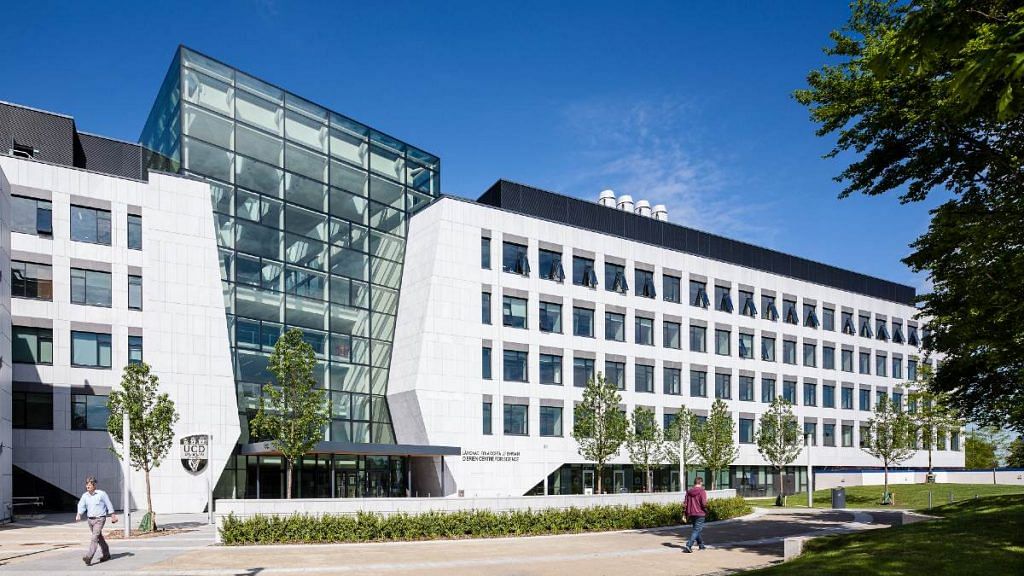New Delhi: The government of Ireland and Irish public universities like University College Dublin are considering collaborations with Delhi University (DU) in order to strengthen bridges of higher education between Ireland and India, said Conor Fahy, regional director, Middle-East, Africa, India at Enterprise Ireland.
Enterprise Ireland is a government agency tasked with the development and growth of Irish enterprises around the world, including in India.
The areas being considered for collaboration include science and technology, life sciences, healthcare and the pharmaceuticals sector.
In an interview with ThePrint Monday, Fahy said: “The government of Ireland and institutions like University College Dublin are exploring collaborations and a potential MoU with Delhi University. Today, we had an exploratory discussion with 10 members from the DU faculty and we proposed different ideas of what could be the constituent parts of such an agreement.”
Higher education is an area where there is greater scope for collaboration between India and Ireland, Fahy said, adding that Ireland hopes to bolster trade relations between the two countries, with more high-level ministerial visits.
According to the DU website, it currently has MoUs with over 80 universities across 37 countries.
Speaking to ThePrint, DU Vice-Chancellor Yogesh Singh confirmed that an MoU with various Irish universities will likely be signed by the end of 2022.
“We feel very positive about signing an MoU with Irish universities by the end of 2022. University College Dublin, Trinity College Dublin, University College Cork and National University of Ireland, Galway, are some of the institutes we’re looking at to enable student and teacher transfers,” Yogesh Singh told ThePrint.
Asked what the potential areas of joint research collaboration are, he added: “Healthcare is one sector. Another important one is IT. For example, you will find the largest presence of TCS and Infosys in Ireland. Also, they [Ireland] have an edge on business and technology incubators within their universities. So, we can learn from them and our universities can benefit from this too.”
Over 5,000 Indian students are studying in Ireland. According to data from Ireland’s Higher Education Authority (HEA), 11 per cent of students across Irish universities are from other countries. An estimated 4.39 per cent are from India.
Ireland is home to approximately 45,000 Indians, mainly working in the healthcare, IT and engineering sectors, often in senior management positions.
Also read: ‘Will give students what they get abroad’ — India plans tie-ups with top 100 universities
Collaboration in life sciences, healthcare
On the issue of collaborative research in science and technology, Fahy explained that Ireland has access to funding via the Horizon Europe Programme.
Horizon Europe is the EU’s key funding programme for research and innovation, with a budget of €95.5 billion (Rs 8 lakh crore).
“Ireland is the recipient of significant access to the EU’s funding through the Horizon Europe programme. Part of that programme is that research institutions undertake collaborations internationally. There’s great potential for India in that respect in areas of sustainability, food security etc,” said Fahy.
Enterprise Ireland serves as the conduit in Ireland for the Horizon Europe programme, bringing together research teams and facilitating international collaboration.
Fahy identified life sciences and healthcare as an overlapping area of interest.
“India has been a huge contributor internationally to healthcare, being the largest producer of vaccines in the world. India produces a lot of APIs (Active Pharmaceutical Ingredients), which are critical components in generic drugs like paracetamol. That kind of exchange of technology in the life sciences sector is really important. Similarly, we have an aerosol drug delivery firm that has helped particularly children,” he said.
“Ireland is the third largest exporter of pharmaceuticals globally and India is up there as well. So there’s major scope for collaboration. Also, the pharma sector in Ireland is well integrated with the EU,” he pointed out.
Using education to deepen FDI
Fahy also emphasised the need to bridge higher education between India and Ireland, saying it will complement the effectiveness of Foreign Direct Investment (FDI).
“Ireland found out the hard way in the 1970s, when we were very open in attracting FDI, that the FDI coming into Ireland was low-skilled, low-value and it wasn’t very deep-rooted,” he said.
“So the trick about education is if you can bring your supply of graduates or PhD students — of which India has an abundance — you have an opportunity to deepen FDI,” he added.
(Edited by Saikat Niyogi)
Also read: ‘Lot of enthusiasm’ among foreign universities to start branches in India, Pokhriyal says
